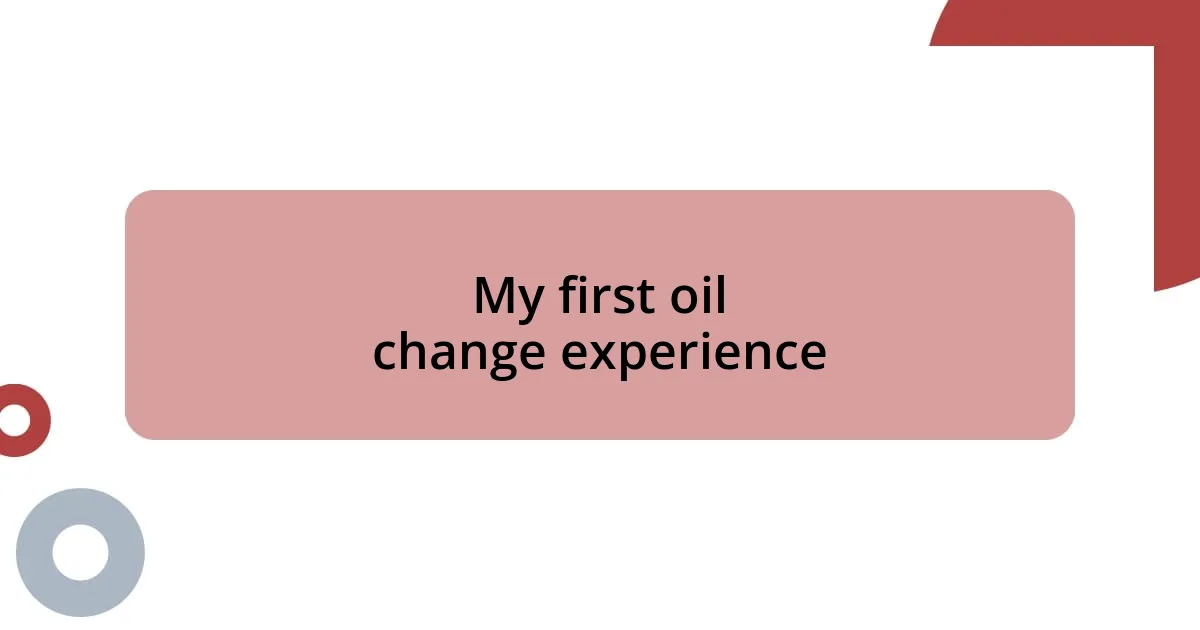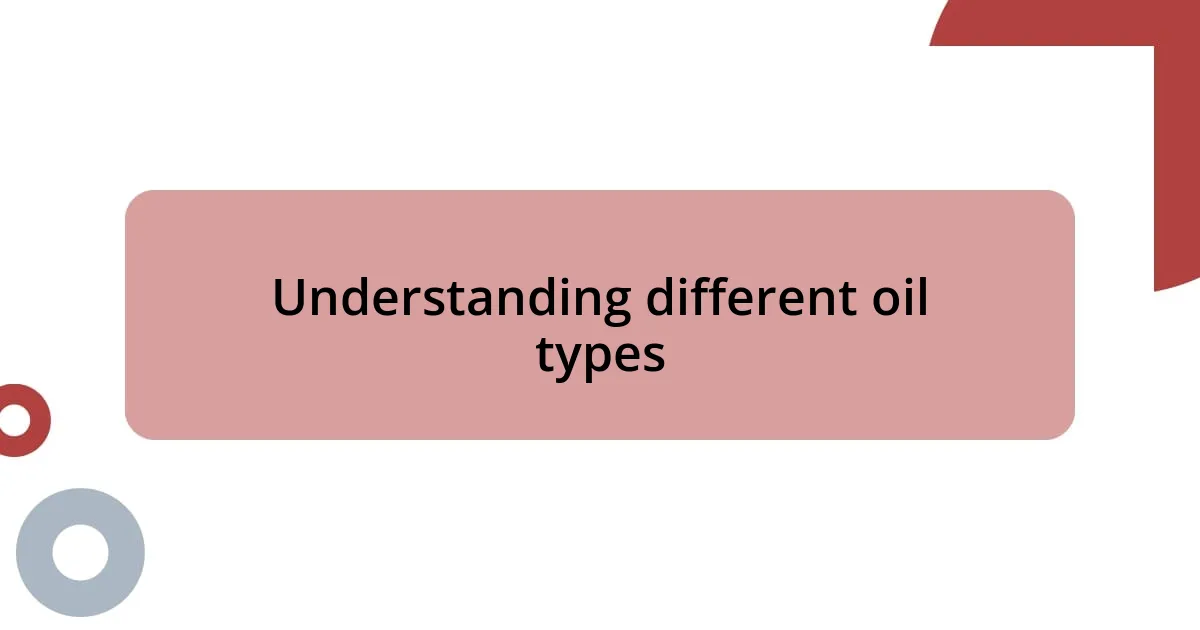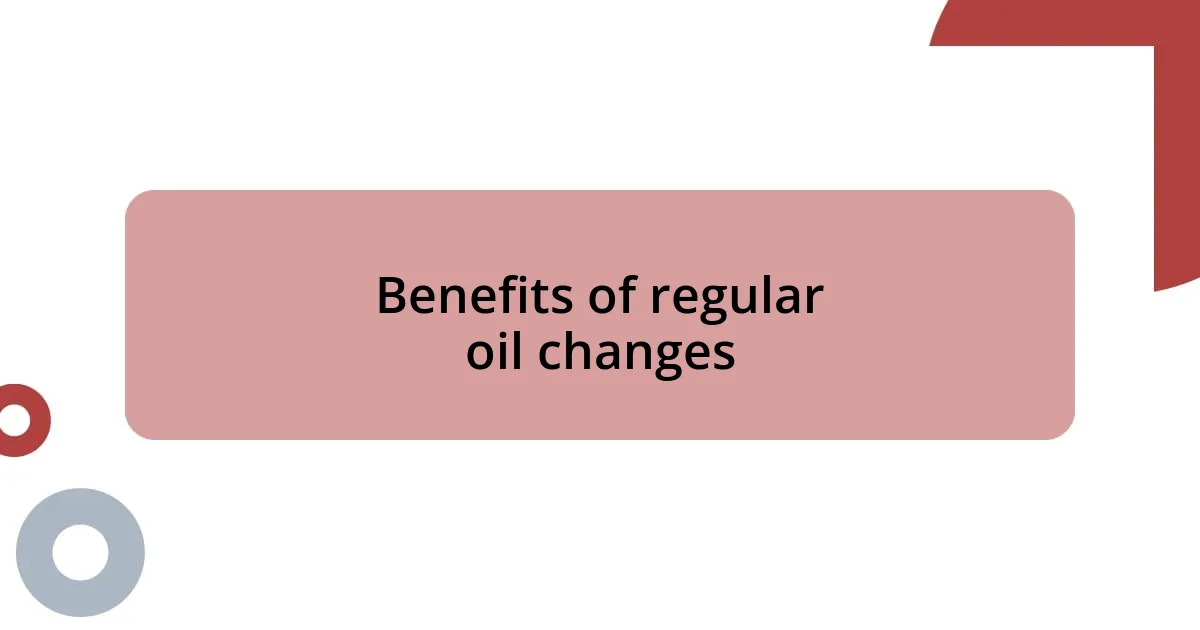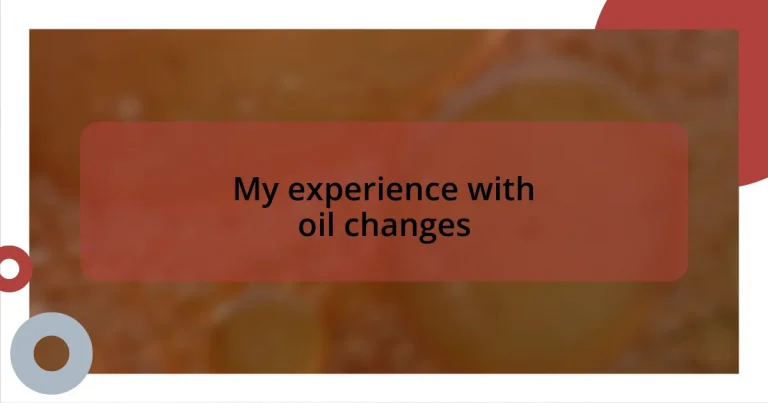Key takeaways:
- First-hand experience of oil changes fosters a deeper connection with the vehicle and a sense of empowerment.
- Understanding oil types and viscosity significantly impacts engine performance and longevity.
- Avoid common oil change mistakes, such as neglecting the oil filter and not checking oil levels, to prevent engine issues.
- Regular oil changes enhance engine cleanliness, extend vehicle life, and improve fuel efficiency.

My first oil change experience
I still remember my first oil change like it was yesterday. I felt a mix of excitement and anxiety as I approached my old sedan, wondering if I could really handle it on my own. What if I made a mistake?
As I gathered my tools in the driveway, the smell of the oil wafted through the air, almost commanding my attention. I vividly recall that moment when I unscrewed the drain plug, and a stream of dark, thick oil flowed out. It was a little gross, but honestly, it felt strangely fulfilling to know I was part of caring for my vehicle.
When I poured in the new, golden oil, I realized that I was forging a deeper connection with my car. It was no longer just a means of transportation; it felt like a partnership. Have you ever taken that step to be hands-on with your vehicle? There’s something empowering about it that I didn’t expect at all.

Understanding different oil types
Understanding different oil types can seem overwhelming, but it’s crucial for the longevity of your engine. Like many, I was once confused by the jargon. I still recall my first encounter with synthetic oil—I was amazed by its durability. Synthetic oils resist breakdown better than conventional oils, which means your engine operates more efficiently. It was a lightbulb moment for me when I realized that choosing the right oil could lead to better performance and fewer trips to the mechanic.
When discussing oil types, viscosity is key. It refers to how easily the oil flows at certain temperatures, and it’s why you often see terms like “5W-30” on labels. The “5W” indicates how the oil performs in winter temperatures, while “30” tells you how it behaves at high temperatures. Choosing the right viscosity matters; for example, using oil that’s too thick in cold weather can lead to poor lubrication. This understanding changed how I approached oil changes and improved my vehicle’s performance immensely.
Furthermore, there are oils meant for different driving conditions—especially if your driving habits lean toward stop-and-go traffic or frequent highway usage. I discovered that high-mileage oils contain additives designed to protect older engines. After switching to high-mileage oil, I noticed less noise and smoother performance. Has this experience resonated with you too? It’s fascinating how something as simple as oil can make a significant difference in how your car feels.
| Oil Type | Key Features |
|---|---|
| Synthetic | Durable, better performance, higher resistance to breakdown |
| Conventional | Affordable, good for basic needs, requires more frequent changes |
| High-Mileage | Contains additives for older engines, reduces leaks and wear |
| Multi-Viscosity | Functions well in both hot and cold temperatures |

Common mistakes to avoid
One common mistake I’ve experienced, and I know many people often fall into, is forgetting to check the oil level after replacing it. I remember the first time I finished my oil change, feeling a surge of pride. I confidently fired up the engine and drove off, only to realize later that I hadn’t checked the dipstick. This oversight led to a strange noise in the engine, and it made me question my skills. It’s a simple step that can save you from more significant issues down the road.
Here are some mistakes to avoid during your oil change:
– Neglecting the oil filter: Always replace the oil filter when you change the oil. A clogged filter can lead to dirty oil circulating in your engine.
– Using the wrong type of oil: Each vehicle has specific oil requirements. Ignoring this can damage your engine.
– Overfilling the oil: Too much oil can create pressure and lead to leaks or damage.
– Not properly disposing of old oil: Take it to a recycling center. Don’t just dump it; it’s harmful to the environment.
Reflecting on these points, I believe that a bit of care can truly enhance your experience and your vehicle’s performance. A successful oil change feels like a small victory!

Benefits of regular oil changes
Regular oil changes bring with them a host of benefits that I’ve personally appreciated over the years. For one, they help maintain engine cleanliness. I remember when I neglected an oil change for too long and noticed a stubborn sludge building up in my engine. It was unsettling, to say the least. Once I started sticking to a routine, I could feel the engine running smoother, and it offered me peace of mind.
There’s also the matter of extending the life of your vehicle. I can still recall someone telling me that oil changes are like routine check-ups for your car. At first, I thought it was just hyperbole, but after consistently changing my oil, I noticed fewer repairs and longer stretches between visits to the mechanic. Isn’t it comforting to know that one small act can pay off big time in the long run?
Another key benefit is fuel efficiency. I once timed how often I filled up my gas tank, and after sticking to regular oil changes, I noticed a difference. My car was more responsive, and it felt like I was getting more miles for my money. It’s like a little gift that keeps on giving; who wouldn’t want to save at the pump? These benefits have reinforced my commitment to timely oil changes, and I hope they resonate with you too!














